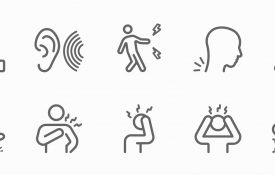-
Clinical Psychological Science – A New Journal
The Association for Psychological Science is pleased to announce the launch of Clinical Psychological Science (CPS), a unique new journal in scope and mission. Under Founding Editor Alan E. Kazdin, Yale University, CPS will present cutting-edge work from psychological science, broadly conceived, as well as from the full range of related disciplines (e.g., genetics, neuroscience, psychiatry, public health) that contribute to clinical study. CPS's emphasis on integrating diverse scientific perspectives and on boundary-crossing research distinguishes it from traditional journals and places it at the forefront of an exciting new era in clinical science.
-

A New Study Shows How to Boost the Power of Pain Relief, Without Drugs
Placebos reduce pain by creating an expectation of relief. Distractions relieve it by keeping the brain busy. When combined, they make for a potent pain reliever, a study shows. Visit Page
-
Science on Swearing
Timothy Jay knows enough about curse words to make any seven-year-old jealous. The Boston Globe has called him the “Doctor of dirty words,” and he frequently appears in news stories — like this one from the Today Show — to discuss swearing. Even though swearing is frowned upon, research that Jay published in Perspectives on Psychological Science shows that profane language is everywhere, and it has an important purpose. Taboo words pack a lot of emotion, and this allows them to achieve certain goals, such as conveying frustration or humor, more easily than non-taboo words.
-
Opinion: The risks of ignoring race in the workplace
CNN: Editor's note: Evan P. Apfelbaum is an Assistant Professor of Organizational Studies at the MIT Sloan School of Management. His research has been featured in journals including Journal of Personality and Social Psychology, Psychological Science, and Developmental Psychology and has been covered by a range of media outlets, including The New York Times, BBC, and National Public Radio. (CNN) -- Larry, one of the employees you supervise, hasn't been performing his job up to expectations. But you've been reluctant to take him aside and speak with him candidly: Like most senior people in the company, you are white.
-
Study of the Day: Religion Boosts Patience, Has Practical Benefits
The Atlantic: Faith doesn't just assuage fears about the afterlife. Research published in Psychological Science shows that it fuels self-control too. PROBLEM: Religious believers are often called on to exercise self-control. Christians, for instance, are commanded not to lie, steal, or covet thy neighbor's wife. But can following one's faith, which uses up so much willpower, also replenish this limited resource? METHODOLOGY: Researchers led by Queen's University psychology graduate student Kevin Rounding asked participants to unscramble five-word sentences, some of which contained religious themes.
-
Fighting willpower’s catch-22
ScienceNews: Willpower comes with a wicked kickback. Exerting self-control saps a person’s mental energy and makes the next desire that inevitably comes along feel more compelling and harder to resist, a study of people’s daily struggles with temptation found. But people best able to resist eating sweets, going out with friends before finishing work or other temptations find ways to steer clear of such enticements altogether, so that they rarely have to resort to self-control, psychologist Wilhelm Hofmann of the University of Chicago reported January 28 at the annual meeting of the Society for Personality and Social Psychology.

